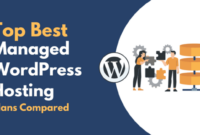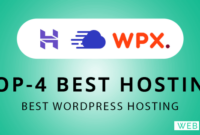Managed hosting provider offers a comprehensive solution for individuals and businesses seeking reliable web hosting services. From essential features to key benefits, this guide explores the world of managed hosting providers in depth.
Definition of Managed Hosting Provider

A managed hosting provider is a company that offers services to manage and maintain a client’s website or application on their servers. This type of hosting is ideal for businesses or individuals who lack the technical expertise or time to handle the day-to-day operations of running a website.
Role of a Managed Hosting Provider
A managed hosting provider plays a crucial role in the context of web hosting by taking on the responsibility of managing the server infrastructure, security, updates, backups, and technical support for their clients. This allows businesses to focus on their core activities without worrying about the technical aspects of hosting.
- Proactive monitoring of servers to ensure optimal performance and uptime
- Security measures such as firewalls, malware scanning, and DDoS protection
- Regular software updates and patches to keep the server secure
- Automated backups and disaster recovery plans to prevent data loss
- 24/7 technical support to assist with any issues or concerns
Benefits of Using a Managed Hosting Provider
Managed hosting providers offer a range of benefits that can greatly enhance the performance, security, and overall experience of hosting your website or application. Let’s explore some of the advantages of opting for a managed hosting provider and compare them with other hosting options.
Enhanced Security and Monitoring
Managed hosting providers offer robust security measures to protect your data and website from cyber threats. They continuously monitor for any suspicious activities and take proactive steps to prevent security breaches. This level of security is often not available with other hosting options, making managed hosting a safer choice for sensitive data and critical applications.
Expert Support and Maintenance
With a managed hosting provider, you have access to a team of experts who can assist you with any technical issues or maintenance tasks. This includes regular updates, backups, and optimization to ensure your website or application runs smoothly at all times. This level of support is invaluable for businesses that lack the technical expertise or resources to manage their hosting environment effectively.
Scalability and Flexibility
Managed hosting providers offer scalable solutions that can accommodate your growing needs without requiring you to migrate to a different hosting environment. This flexibility allows you to easily scale up or down based on your traffic and resource requirements, ensuring optimal performance without any downtime or disruptions.
Cost-Efficiency, Managed hosting provider
While managed hosting may come at a higher price point compared to other hosting options, the cost-efficiency lies in the value it provides. By outsourcing the management of your hosting environment, you save time, resources, and potential costs associated with downtime or security breaches. In the long run, the peace of mind and reliability offered by a managed hosting provider can result in significant cost savings.
Optimized Performance and Speed
Managed hosting providers optimize your server environment for maximum performance and speed. This includes using advanced caching mechanisms, content delivery networks (CDNs), and other tools to ensure fast loading times and seamless user experience. This level of optimization is often challenging to achieve with self-managed hosting solutions.
Compliance and Regulatory Requirements
For businesses operating in regulated industries or handling sensitive data, compliance with industry standards and regulations is crucial. Managed hosting providers often have expertise in meeting these compliance requirements, ensuring that your hosting environment aligns with legal and regulatory standards. This can save you time and effort in navigating complex compliance issues on your own.
Overall, opting for a managed hosting provider offers a range of benefits that can enhance the performance, security, and scalability of your website or application. By leveraging the expertise and resources of a managed hosting provider, you can focus on growing your business without worrying about the technical aspects of hosting management.
Key Features to Look for in a Managed Hosting Provider

When choosing a managed hosting provider, it’s crucial to consider certain key features that can make a significant difference in the performance and reliability of your website or application. Let’s explore some of the essential features to look for in a managed hosting provider.
Scalability and Flexibility
One of the most critical features to look for in a managed hosting provider is scalability and flexibility. Your hosting needs may change over time, and you need a provider that can easily accommodate growth and fluctuations in traffic. Look for a provider that offers scalable resources, such as CPU, RAM, and storage, and allows you to upgrade or downgrade your plan based on your requirements.
Security Measures
Security is paramount when it comes to hosting your website or application. A reliable managed hosting provider should offer robust security measures to protect your data and sensitive information from cyber threats. Look for features such as firewalls, DDoS protection, malware scanning and removal, SSL certificates, regular backups, and proactive monitoring to ensure the security of your online assets.
Managed Hosting Provider vs. Self-Managed Hosting

When it comes to choosing between a Managed Hosting Provider and Self-Managed Hosting, it’s crucial to understand the key differences in management responsibilities and the implications they have on your website or application.
Management Responsibilities
- Managed Hosting Provider: With a managed hosting provider, the responsibility of server management, security updates, backups, and overall maintenance is handled by the hosting company. This allows you to focus on your core business without worrying about the technical aspects of hosting.
- Self-Managed Hosting: On the other hand, self-managed hosting puts the onus of server management, security patches, backups, and troubleshooting on you or your team. This requires a certain level of technical expertise and time commitment to ensure that your server is running smoothly.
Suitability of Self-Managed Hosting
- Small websites or personal blogs that don’t have complex technical requirements may find self-managed hosting more suitable as it can be cost-effective.
- If you have a dedicated IT team with expertise in server management and are willing to take on the responsibility of maintaining the server infrastructure, self-managed hosting could be a viable option.
Cost Implications
- Managed Hosting Provider: Opting for a managed hosting provider typically comes at a higher cost due to the added services and support provided. However, this cost is justified by the convenience and peace of mind it offers in terms of server management.
- Self-Managed Hosting: Self-managed hosting may seem more cost-effective upfront, but you need to consider the hidden costs associated with managing the server yourself, such as downtime, security vulnerabilities, and potential loss of revenue.
In conclusion, opting for a managed hosting provider can elevate your online presence with top-notch performance and security. With the right provider, you can focus on growing your website while leaving the technicalities in expert hands.
When it comes to unleashing the power of predictive analytics, one cannot overlook the importance of Data predictions using AWS AI. By utilizing advanced AI technology from AWS, businesses can make accurate predictions and stay ahead of the competition.
For those looking to compare two powerful machine learning tools, a detailed analysis of AWS SageMaker vs TensorFlow is essential. Understanding the strengths and weaknesses of each tool can help businesses make informed decisions for their machine learning projects.
Unlocking the power of predictive analytics for time-series data is made easier with Amazon Forecast. This tool provides businesses with accurate forecasts, helping them make strategic decisions based on historical data trends.



